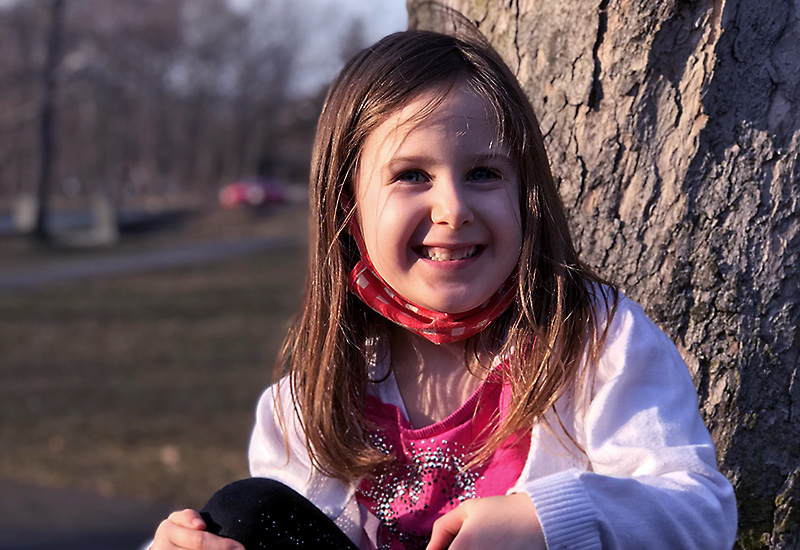Getting a diagnosis of ureteropelvic junction obstruction: Macy’s journey

“It’s ok to be afraid,” says 8-year-old Macy with a strong smile. She would know: She recently experienced a health scare that impacted everything she did, leaving her to feel like she would never get better. While celebrating Hanukkah last year, Macy was playing with her twin sister, Isabel, when she started feeling intense pain in her stomach and began throwing up. Macy’s parents were shocked when she experienced a similar episode three weeks after, and more soon followed.
By the sixth episode, Macy’s doctors believed that she had cyclical vomiting syndrome (CVS), a rare, incurable condition that begins in childhood and causes repeat episodes of vomiting. She began treatment to manage the CVS episodes, but nothing seemed to be helping.
Looking for the right diagnosis
After three months on medication for cyclical vomiting, Macy had a severe episode that escalated her symptoms. When Andrea and Eddie, Macy’s father, saw that things were getting worse, they knew she needed more specialized care. The next few days were spent in the emergency department and inpatient unit at Boston Children’s, with countless tests and clinicians.
It was then that a team of specialists led by Dr. Hsin-Hsiao (Scott) Wang, a urologist in the Department of Urology at Boston Children’s Hospital, found some new answers. An ultrasound of her kidneys identified a massive obstruction at the base of her ureter from a blood vessel. Macy was then diagnosed with severe ureteropelvic junction obstruction (UPJO) — a blockage of urine flow from the renal pelvis to the ureter.
“Dr. Wang and his team knew immediately that this blockage was the source of her vomiting,” says Eddie. “His team coordinated to get us in within days for an initial consult and tests, and we were able to schedule surgery five weeks after our initial consult.”
The couple was relieved to find an answer — and impressed with the experience. “The care team was incredible. Dr. Wang, not only spoke with us, the parents, about the diagnosis and the surgery — he also explained everything in terms that Macy would understand, so she knew exactly what was happening,” shares Angela.
Finding answers in unlikely places
In the process, Dr. Wang and his colleagues stumbled across a shocking revelation: Macy had this before. When she was still in the womb, an ultrasound identified hydrogen build-up on her kidneys. When she was 4 months old, Macy went for a follow-up appointment where additional tests seemed to show things had resolved. However, when she was 4 years old, an ultrasound again revealed an obstruction, but her doctor believed it to be un-alarming.
To add another piece to the puzzle, Andrea’s sister had experienced the same UPJO diagnosis when she was a child — causing Andrea to believe that this could be a hereditary condition. “Dr. Wang was so calming and knew the research backing the diagnosis. He reassured us that this wasn’t hereditary, but there are family clusters where this diagnosis can appear. He even took the time to examine Isabel to make sure she wasn’t affected.”

The journey to recovery
Then, it was time for surgery. “I was a little scared, but I was able to bring my favorite stuffed animal and that made me feel better,” says Macy with a cheerful grin. After a robotic-assisted pyeloplasty, Macy’s kidneys completely recovered — but not without showing just how severe her case was. “There were two obstructions: one at the top of the kidney with a blood vessel and one at the bottom,” says Andrea. “It was scary to hear how extreme her case was, but thankfully her first surgery and her follow-up procedure this past January went perfectly and she’s doing wonderful now.”
Andrea and Eddie both stress the importance of asking questions and communicating with the care team. “The transparency that Dr. Wang and the other specialists all collaborated under was just incredible. We never once felt like we weren’t part of the team and were included in every step.”
Now, Macy and Isabel can swim, dance ballet, and run around together without fear of Macy falling ill. “I always think of how grateful I am that Dr. Wang helped me,” Macy says. With Macy fully recovered, she now wakes up each morning belting out songs with her sister and greets everyone with a big smile. “It’s amazing it is to see how far she’s come,” says her mom. “She’s incredible.”
Learn more about Boston Children’s Department of Urology or make an appointment.
Related Posts :
-

Bladder surgery after Ewing sarcoma helps Paralympian get back on the slopes
Thomas Walsh’s email signature includes the phrase, “No struggle, no progress.” It’s a motto that Thomas, 27, has lived ...
-

Urology care uncovers a surprising culprit in Brendan's mystery illness
Brendan Grenier doesn’t remember the first time he met Dr. Joseph Borer, a surgeon in the Department of Urology ...
-

Harnessing the power of machine learning to improve urology care
Urodynamics — a group of tests that evaluate how well the body collects, and then releases, urine — can be crucial for ...
-

Drawing on data to revolutionize pediatric urology
At first blush, data analytics — sifting through raw data to discover patterns and draw conclusions from them — seems far afield ...





